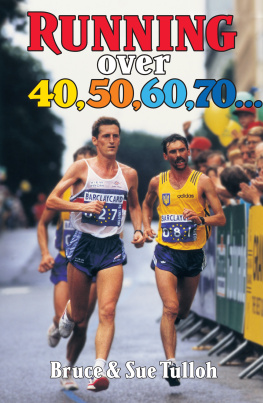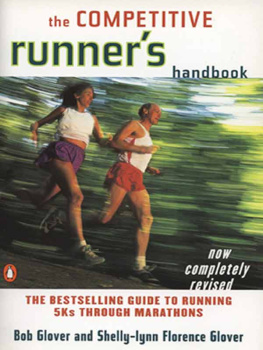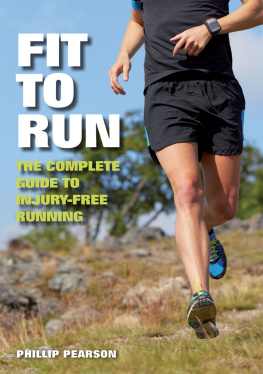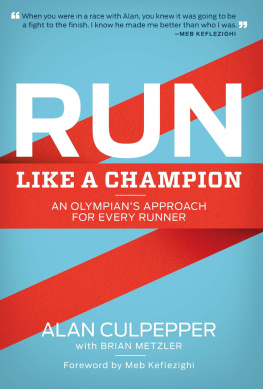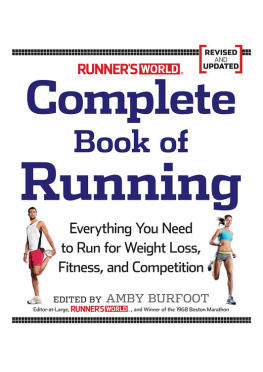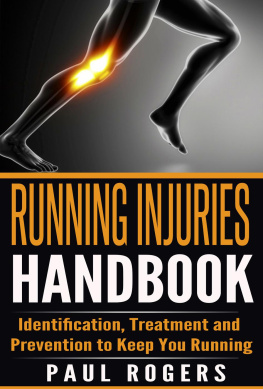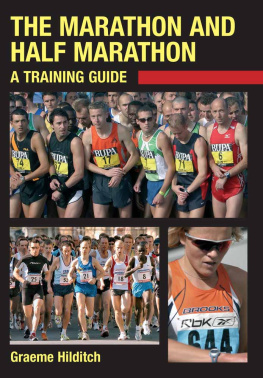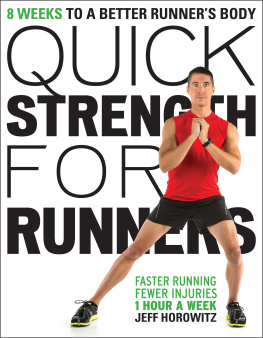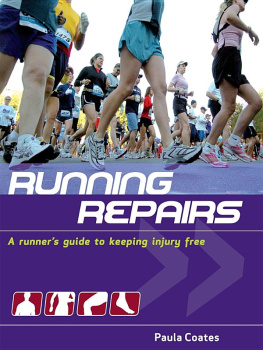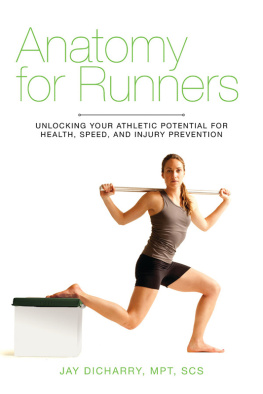Tulloh Bruce - Running Over 40, 50, 60, 70...
Here you can read online Tulloh Bruce - Running Over 40, 50, 60, 70... full text of the book (entire story) in english for free. Download pdf and epub, get meaning, cover and reviews about this ebook. City: Marlborough;Wiltshire, year: 2015, publisher: Tulloh Books, genre: Art. Description of the work, (preface) as well as reviews are available. Best literature library LitArk.com created for fans of good reading and offers a wide selection of genres:
Romance novel
Science fiction
Adventure
Detective
Science
History
Home and family
Prose
Art
Politics
Computer
Non-fiction
Religion
Business
Children
Humor
Choose a favorite category and find really read worthwhile books. Enjoy immersion in the world of imagination, feel the emotions of the characters or learn something new for yourself, make an fascinating discovery.
- Book:Running Over 40, 50, 60, 70...
- Author:
- Publisher:Tulloh Books
- Genre:
- Year:2015
- City:Marlborough;Wiltshire
- Rating:5 / 5
- Favourites:Add to favourites
- Your mark:
- 100
- 1
- 2
- 3
- 4
- 5
Running Over 40, 50, 60, 70...: summary, description and annotation
We offer to read an annotation, description, summary or preface (depends on what the author of the book "Running Over 40, 50, 60, 70..." wrote himself). If you haven't found the necessary information about the book — write in the comments, we will try to find it.
Running Over 40, 50, 60, 70... — read online for free the complete book (whole text) full work
Below is the text of the book, divided by pages. System saving the place of the last page read, allows you to conveniently read the book "Running Over 40, 50, 60, 70..." online for free, without having to search again every time where you left off. Put a bookmark, and you can go to the page where you finished reading at any time.
Font size:
Interval:
Bookmark:

Appendix 1
Appendix 2
Appendix 3
Appendix 4
This book is dedicated to all our athletes, from whom we have learned as much as we have taught
Thanks are due to the following for their contributions:
Margaret Auerback, Keith Anderson, Richard Barrington, British Veterans Athletic Federation, Richard Cashmore, John Collins, Frank Copping, Douglas Cowie, Bruce Davidson, Colin Dow, Martin Duff, Bill Foster, Pat Gallagher, Nigel Gates, Jenny Gray, Ralph Henley, Gareth Jones, Steve James, Peter Lee, Terry McCarthy, Mick McGeogh, Jenny Mills, Steve Mottershead, Sharman Patterson, Bob Pape, Martin Rees, Roger Robinson, John Seed, Kevin Shannon, Helen Stokes, Nigel Stuart-Thorn, Jonathan Such, Ted Townsend, Alan Trengove, Ian Vaughan-Arbuckle
and all those others
who sent in questionnaires.
Photography
Jeremy Hemming
Mark Shearman
Steven Smythe
Noel Tamini
I wrote the first edition of this book, with my wife, Sue, in the winter of 2000/2001, when I was a sprightly 65. We have had a lot of positive feedback, and the principles remain as reliable as ever. The standards of veteran running, and the numbers of participants, have continued to rise, as can be seen by a look at the records section.
However, it is not my intention to write Running over Eighty. Even for those who are used to it, running becomes increasingly hard work. Exercise is good for the over-eighties, as for anyone, but you should walk before you run. My latest production How to Avoid Dying (for as long as possible) is for anyone over 60 who wants to remain fit and healthy. For the over-forties who are just discovering running I say Welcome you have many happy years ahead of you .
Bruce Tulloh
Marlborough
September 2015
Afoot, light-hearted, I take to the open road,
the long brown path before me leading
wherever I choose.
WALT WHITMAN
Walt Whitman wrote those words in 1870, and no one has been able to improve on them as an expression of the freedom of running.
To you who are reading these words we say: Welcome! Enter the limitless world which the runner enjoys.
Whether you are new to running or have been at it for thirty years, there is always more to learn and more to experience. You will go to places you have never seen before. You will go to some places you will never wish to see again. You will meet all sorts of people and some of them will become your friends. Above all, you will learn more about yourself, and not only in a physical sense. Running can improve you physically and mentally. It can cure depression, improve your appetite and make your legs look better. It can also turn you into a self-obsessed prig but if that makes you happy...
There is another aspect to running which cannot be found in any other sport, that of taking part in international events alongside the international runners. You cannot kick about on the Wembley turf or join in on the tail of the England innings at Lords, but you can run in the Great North Run, the London Marathon or the World Veterans Championships and be competing with Olympic champions. Sometimes you can even finish ahead of them!
It may seem egotistical to put this in at the beginning, but I think it will help to explain some of my references later on.
I have been running for well over fifty years and I have been an over-forty for thirty years. In my youth I was a good track runner European champion at 5000m, AAA champion several times, British and European record-holder for ten years, in the days when two mile, three miles and six miles were standard distances. I ran a mile in under four minutes, two miles in eight minutes and 30 seconds, three miles in 13:12 and six miles in 27:23 secs (worth 28:23 for 10k).
I also ran cross-country for twenty years at all levels, from schoolboy to England international. I didnt run many road races, but I did run five miles in twenty-three minutes, ten miles in forty-eight minutes and twenty miles in 101 minutes. In eleven years of serious competition I ran six hundred races, travelled everywhere and met most of the worlds leading runners and coaches men such as Arthur Lydiard, Mihaly Igloi and Percy Cerutty, runners such as Emil Zatopek, Murray Halberg and Gordon Pirie. After I retired from the track I ran from Los Angeles to New York, covering the 3000 miles in sixty-five days and beating the previous record by eight days.
Most of my working life has been spent teaching biology and everywhere that I have taught mainly in England, but also in Kenya and America I have coached runners. When my school athletes left school I continued to coach the keener ones and that led me on to picking up and coaching a number of other athletes. In the last ten years I have coached nearly twenty international distance runners. Between them they have won national titles at every level English schools, British Universities, National Junior and Senior cross-country titles, AAA championships on the track and on the road, at every distance from the 1500m to the marathon, and competed in the Olympic, European and Commonwealth Games as well as the World Track and Field and the World Cross-Country championships.
Of all those athletes, Richard Nerurkar stands out, for I learned at least as much from him as he learned from me. I started advising Richard in 1987, when he was leaving Oxford and going to Harvard. In 1989 he moved to Marlborough and took up a part-time teaching job at the boarding school of that name, where I had been teaching for fifteen years. This was the beginning of an unforgettable ten-year period in which Richard became Britains leading long-distance runner. He became national champion at 10000m and later at the marathon. He won the national cross-country title three times, and led the British team to a medal in the World Championships. He finished fifth in the 1996 Olympic marathon and in 1993 he became the first British marathon runner to win a major title for nineteen years, when he won the World Cup marathon in San Sebastian.
To achieve these goals Richard put everything into his running, going up to 140 miles a week. Every winter we went to Kenya for altitude training and in most summers we went to Font Romeu in the Pyrenees for more altitude training. We also trained in Albuquerque, Boulder, and St. Moritz (all high altitude venues), in Florida, Finland, Greece, Italy, Japan, Mexico, Sweden and South Africa, either for the altitude benefits or for heat acclimatisation (yes, its a tough life!). In those training camps we met most of the worlds leading distance coaches and their athletes, and found out as much as possible about their methods. We talked to experts in nutrition, exercise physiology, weight training and sports psychology. We tried to learn about everything which was relevant to our purpose how to develop Richards potential as far as possible without using drugs or getting him injured. Although an injury eventually forced him to retire at the age of thirty-six, a few months short of competing in his third Olympics, I take pride in the fact that he was able to compete successfully at international level every year for ten years, usually as British number one. His best performances, apart from the World Cup win, included a 2 hr 08:36 marathon, a half marathon in 61:06 and a 10000m in 27:40.0.
Font size:
Interval:
Bookmark:
Similar books «Running Over 40, 50, 60, 70...»
Look at similar books to Running Over 40, 50, 60, 70.... We have selected literature similar in name and meaning in the hope of providing readers with more options to find new, interesting, not yet read works.
Discussion, reviews of the book Running Over 40, 50, 60, 70... and just readers' own opinions. Leave your comments, write what you think about the work, its meaning or the main characters. Specify what exactly you liked and what you didn't like, and why you think so.

